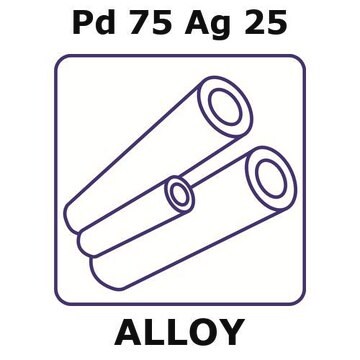GF50683631
Palladium
tube, 50mm, outside diameter 2.0mm, inside diameter 1.6mm, wall thickness 0.2mm, as drawn, 99.95%
Synonym(e):
Palladium, PD007150
About This Item
Empfohlene Produkte
Assay
99.95%
Form
tubes
Hersteller/Markenname
Goodfellow 506-836-31
Widerstandsfähigkeit
9.96 μΩ-cm, 20°C
L × Wandstärke
50 mm × 0.2 mm
AD × ID
2.0 mm × 1.6 mm
bp
2970 °C (lit.)
mp (Schmelzpunkt)
1554 °C (lit.)
Dichte
12.02 g/cm3 (lit.)
SMILES String
[Pd]
InChI
1S/Pd
InChIKey
KDLHZDBZIXYQEI-UHFFFAOYSA-N
Suchen Sie nach ähnlichen Produkten? Aufrufen Leitfaden zum Produktvergleich
Allgemeine Beschreibung
Rechtliche Hinweise
Lagerklassenschlüssel
13 - Non Combustible Solids
WGK
nwg
Flammpunkt (°F)
Not applicable
Flammpunkt (°C)
Not applicable
Hier finden Sie alle aktuellen Versionen:
Analysenzertifikate (COA)
Leider sind derzeit keine COAs für dieses Produkt online verfügbar.
Wenn Sie Hilfe benötigen, wenden Sie sich bitte an Kundensupport
Besitzen Sie dieses Produkt bereits?
In der Dokumentenbibliothek finden Sie die Dokumentation zu den Produkten, die Sie kürzlich erworben haben.
Unser Team von Wissenschaftlern verfügt über Erfahrung in allen Forschungsbereichen einschließlich Life Science, Materialwissenschaften, chemischer Synthese, Chromatographie, Analytik und vielen mehr..
Setzen Sie sich mit dem technischen Dienst in Verbindung.

